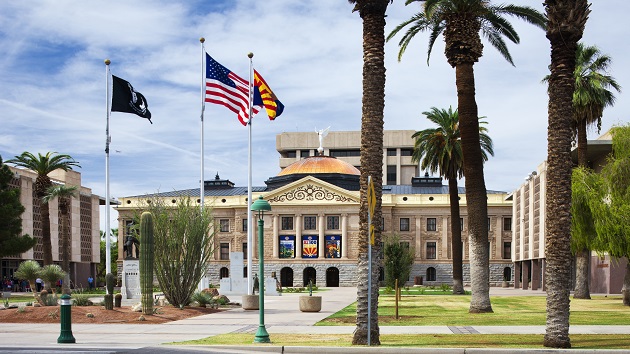Arizona Republicans block another Democratic effort to repeal 1864 abortion ban

(PHOENIX) — Arizona Republicans on Wednesday again blocked a Democratic-led effort to repeal a controversial 19th-century ban on almost all abortions in the state, which the Arizona Supreme Court has ruled is enforceable.
Democrats in the state House failed to overcome procedural obstacles to advance House Bill 2677, introduced by Democratic state Rep. Stephanie Stahl Hamilton, to repeal the 1864 abortion law, which predates Arizona’s statehood and only provides exceptions to save the life of the pregnant woman.
Only one of the Republican representatives joined with the Democratic minority, leaving them one vote short of pushing the bill forward.
“The last thing we should be doing today is rushing a bill through the legislative process to repeal a law that has been enacted and reaffirmed by the Legislature several times,” Speaker Ben Toma, a Republican, said during Wednesday’s state House session.
“Abortion is a complicated topic — it is ethically, morally complex,” said Toma. “I understand that we have deeply held beliefs.”
Assistant Minority Leader Oscar De Los Santos, speaking after Toma, said, “This issue is very simple: Do we support or do we oppose an 1864 territorial abortion ban that includes no exceptions for rape, no exceptions for incest?”
He continued: “We heard the speaker mention that we shouldn’t be rushing this process. Members, we have had since 1864 to repeal this abhorrent law,”
Arizona lawmakers had reconvened on Wednesday after a week’s recess, with much attention was on the repeal bill and whether it would move forward.
It’s unclear how Democrats will next attempt to roll back the strict ban, though members in the state Senate have said they plan to act quickly to take up such efforts in their chamber later Wednesday.
The Arizona Supreme Court’s ruling reviving the 1864 ban immediately roiled the politics of the key swing state — being celebrated by abortion opponents and denounced by abortion access advocates and Democrats, while top Republicans, including Donald Trump, said it went too far.
The ban remains temporarily on hold but Arizona Attorney General Kris Mayes said this week that the earliest it could take effect is June 8 — “absent any additional litigation” or legislative action.
Anyone found guilty of violating it will face two to five years in state prison. Mayes previously said she would not prosecute providers under the law.
Arizona Right to Life, an anti-abortion group, on Wednesday planned to hold rally outside the state Capitol in support of the 1864 ban.
The Arizona for Abortion Access coalition was also set to hold a rally outside of the state Capitol.
If Arizona lawmakers attempt repeal again, how would it work?
Hamilton’s repeal bill, which failed to advance on Wednesday, already passed two readings in the Arizona House, setting it up for another attempt at a floor vote — after one more step.
A member will need bring up a motion to waive the normal procedures to consider the bill, since it has not yet been heard in a committee.
That waive motion was opposed by nearly all Republicans in the state House majority on Wednesday. But if it ever succeeds, the repeal ban could then go up for a full House vote and would need 31 votes to pass — a simple majority of legislators in the 60-member chamber.
As there are 29 Democratic members in the Arizona House, the bill needs just two Republican votes to succeed. The GOP members to watch are Reps. Matt Gress, David Cook and Tim Dunn.
Toma, the Arizona House speaker, said last week that lawmakers will not “rush legislation on a topic of this magnitude without a larger discussion,” and Republican lawmakers quashed an earlier, Democratic-led effort to quickly repeal the ban.
“We as an elected body are going to take the time needed to listen to our constituents and carefully consider appropriate actions,” Toma said last week.
The Center for Arizona Policy, which has led the fight against abortion rights at the Legislature and successfully lobbied for myriad restrictions, has called on GOP lawmakers not to repeal the 1864 ban.
If the Arizona House votes yes on the bill, however, there are still more steps and procedures before the ban is formally repealed and off the books.
The proposal, after passing the state House, would then go to the state Senate for yet another vote to waive rules on the bill.
Two Republicans are needed to join Democrats in the state Senate as well, and Sens. Shawnna Bolick and T.J. Shope have said they’d support the repeal.
The legislation may have to go through further procedural steps given that it has not yet been read in the state Senate. That includes a rule requiring bills be heard on three separate days, so it will likely take at least three more days.
To repeal the 1864 ban immediately, lawmakers would have to include an emergency clause in their language but get a two-thirds majority vote for passage. Otherwise, anything approved by the Legislature and signed by the governor does not take effect until 90 days after the end of the legislative session.
Gov. Katie Hobbs, a Democrat, opposes the ban.
“A law passed in 1864 by 27 men is the reason why my 22-year-old daughter now has fewer rights than I did at her age,” she wrote on X on Tuesday. “It’s absolutely outrageous. I’m committed to ensuring that future generations have the essential freedoms they deserve.”
She has reiterated that an executive order she signed in 2023 prohibits county attorneys from going above Mayes, the Arizona attorney general, who has said her office is still analyzing legal options and is continuing plans over what to do if litigation efforts are unsuccessful, including how Arizona can support abortion providers.
Potentially dueling ballot measures on abortion
The Arizona for Abortion Access campaign is working to get a potential constitutional amendment on the state’s ballot in November enshrining abortion access. The campaign has said that they have gathered more than 500,000 signatures – surpassing the necessary threshold.
The proposed amendment would amend Arizona’s Constitution to prohibit the state from legislating against abortion up until fetal viability, which is around 24 weeks into pregnancy; and it enshrines other abortion protections into law.
The Republican-led House counsel in Arizona has, separately, internally proposed a plan to rival the state’s abortion rights ballot initiative by adding ballot initiatives of their own in the wake of what they call “court chaos” on abortion policy, according to a presentation leaked Monday and shared with ABC News.
That proposal includes potentially legislatively-referred ballot initiatives that would compete with the Arizona for Abortion Access measure — to either return to a 15-week ban that had been in effect before the 1864 ruling or offer a six-week ban, with exceptions in both cases for rape, incest, fetal abnormalities and to save the life of “the woman” in the language presented.
Copyright © 2024, ABC Audio. All rights reserved.





